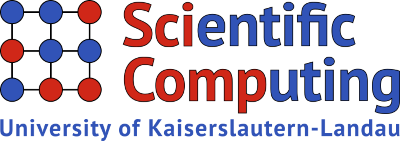Date and Place: Thursdays and hybrid (live in 32-349/online via Zoom). For detailed dates see below!
Content
In the Scientific Computing Seminar we host talks of guests and members of the SciComp team as well as students of mathematics, computer science and engineering. Everybody interested in the topics is welcome.
List of Talks
Event Information:
-
Thu05Jan2023
SC Seminar: Jan Rottmayer
11:45Hybrid (Room 32-349 and via Zoom)
Title: Trailing Edge Noise Reduction by Porous Treatment using Derivative-Free Optimization
Jan Rottmayer, Chair for Scientific Computing (SciComp), TU Kaiserslautern
Abstract:
This talk focuses on the derivative-free optimization algorithm known as Efficient Global Optimization and its application to the noise reduction caused by the blunt trailing edge of an airfoil. We compute noise levels over a range of frequencies and optimize by adjusting porosity and permeability as design parameters.
In general, lifting bodies are used across a wide range of applications, including transportation and energy generation. They can produce unwanted noise in a variety of ways. On the topic of airfoils, the leading causes of noise are leading- and trailing edge noise. The latter occurs when the boundary layer convects turbulent sources over the trailing-edge. [1] demonstrated noise reduction via porous treatment at the trailing edge. „Porous edges and surfaces can act to reduce the correlation of a transitional or turbulent boundary layer, as well as reducing the convection velocity inside the boundary layer, which is an important determining factor for the magnitude of the scattered acoustic waves.“ [2]
We explore this idea on the example of an airfoil with blunt trailing edge and partially porous geometry. The trailing-edge porosity is parametrized to reduce the dimension of the design space. Further, the computational costs are reduced by using an Amiet-based trailing edge noise model and a surrogate-based optimization approach.[1] T.A. Smith, C.A. Klettner. Airfoil trailing-edge noise and drag reduction at a moderate Reynolds number using wavy geometries; https://doi.org/10.1063/5.0120124; 2022
[2] T. Geyer, E. Sarradj. Trailing edge noise of partially porous airfoils; https://doi.org/10.2514/6.2014-3039; 2014How to join online
You can join online via Zoom, using the following link:
https://uni-kl-de.zoom.us/j/63123116305?pwd=Yko3WU9ZblpGR3lGUkVTV1kzMCtUUT09
